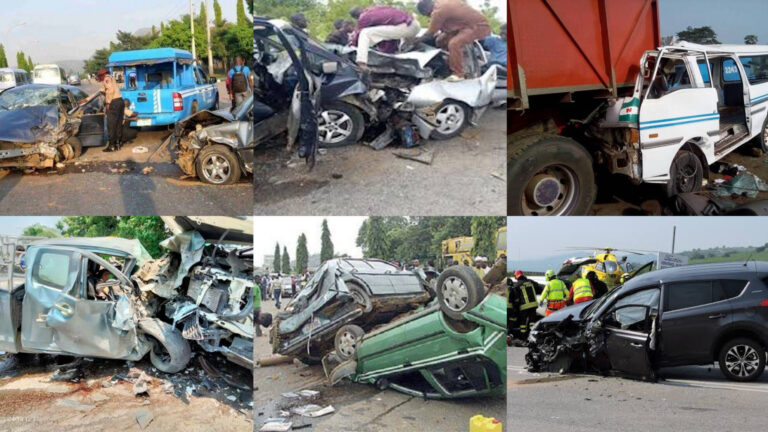As millions of Nigerians journey to their hometowns and villages for the Eid-el-Kabir celebrations, alarming data from DevStats, a DevReporting project that focuses on collecting, analysing, and disseminating data on key developmental issues in Nigeria and Africa by extension, signals a warning for travellers.
According to data gathered from different media reports, at least 365 people died in road accidents across Nigeria between January and March 2025. The deaths were recorded from 82 road crashes across 22 states reported in the media in the first quarter of 2025.
Findings by this newspaper also revealed that no fewer than 1,028 persons were involved in various road accidents within the period under review.
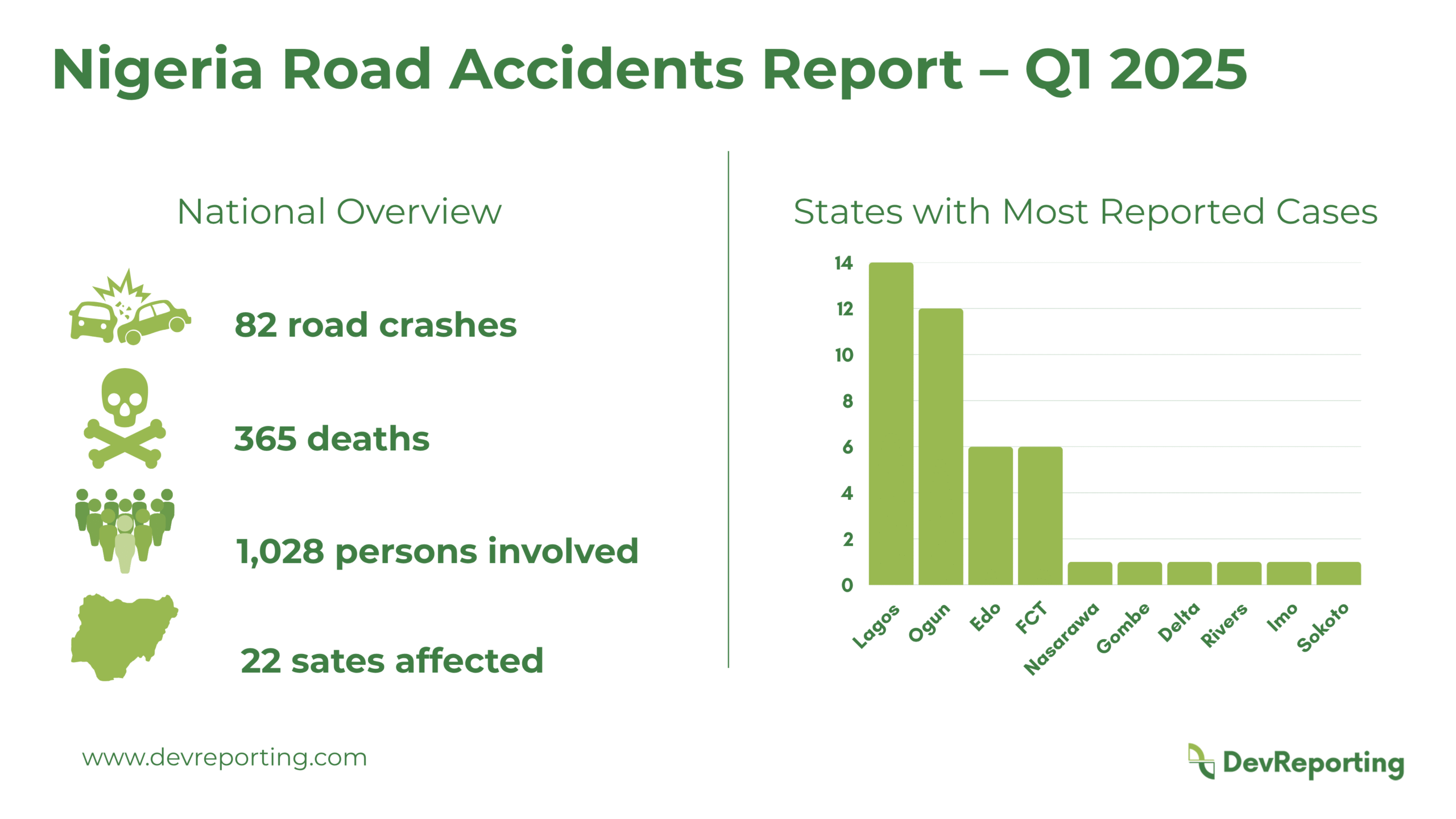
However, the data provided by the Federal Road Safety Corps (FRSC), the country’s government agency responsible for road safety, does not contain the details as requested by the newspaper.
The statistics supplied by the agency’s spokesman, Assistant Corps Marshal Olusegun Ogungbemide, simply gave the total road traffic crashes, persons killed, and those injured, for the first quarter.
A freedom of information request letter seeking the details of the road crashes, including a breakdown of statistics of crashes, injuries, fatalities, types of vehicles, and roads involved across the 36 states of the federation and the Federal Capital Territory (FCT), had yet to be responded to as of the time of filing this report.
READ ALSO: From celebration to mourning: Fatal road accident kills at least 19 Kano athletes
But based on the Nigerian road accident statistics for Q1 2025 collated by this newspaper, Lagos State recorded the highest number of reported incidents with 14 cases, Ogun State followed with 12 cases, while Edo and the Federal Capital Territory (FCT) recorded six cases each.
But Nasarawa, Gombe, Delta, Rivers, Imo, and Sokoto states had one reported case each in the media.
For the number of deaths, Edo State recorded the highest with 53. Niger and Ondo followed with 32 deaths recorded in each state. Similarly, Ogun recorded no fewer than 27 deaths. However, Rivers State recorded the least with just one reported death.
Monthly breakdown
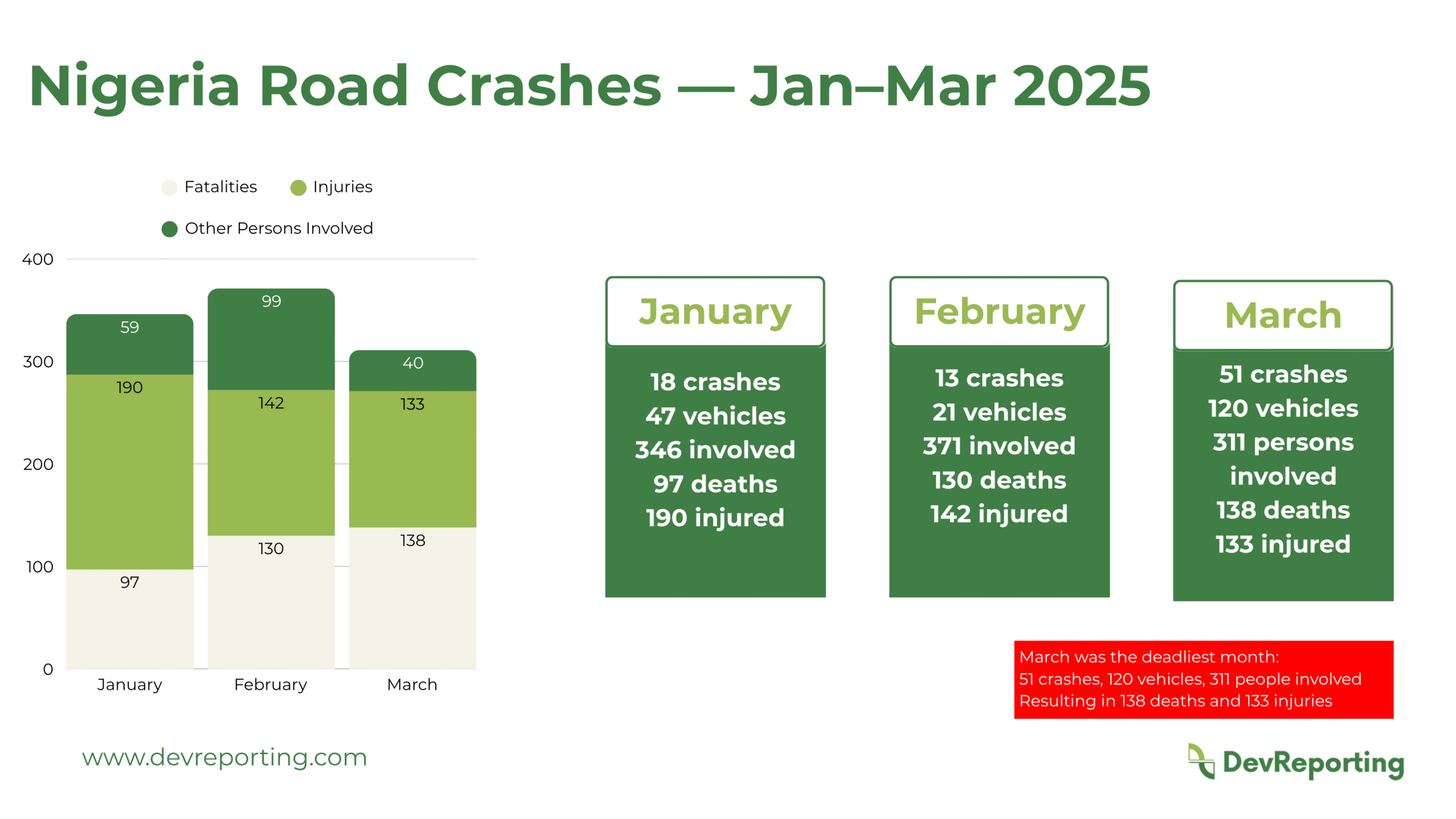
The grim statistics of accidents in Q1 2025 revealed a concerning trend in road safety during the period. According to available data, January saw 18 crashes involving 47 vehicles and 346 persons, resulting in 97 fatalities and 190 injuries.
The second month of the year, February, witnessed 13 cases with 21 vehicles and 371 persons involved, claiming 130 lives, and 142 others injured.
The most alarming figures, however, come from March, which recorded the highest number of reported cases with 51 road crashes and 120 vehicles. While 311 people were involved in various accidents, 138 deaths were recorded, and 133 others injured.
Experts argue these numbers raise serious concerns about road safety and call for immediate attention from authorities to implement measures that can help reduce such incidents in the future.
Samuel Odewumi, a professor of transport planning and policy at Lagos State University (LASU), told DevReporting that despite huge investments in the transportation sector, Nigeria continues to record a high number of road accidents and casualties.
“By any standard, it is too high,” he said in an interview with our reporter.
Vehicles involved
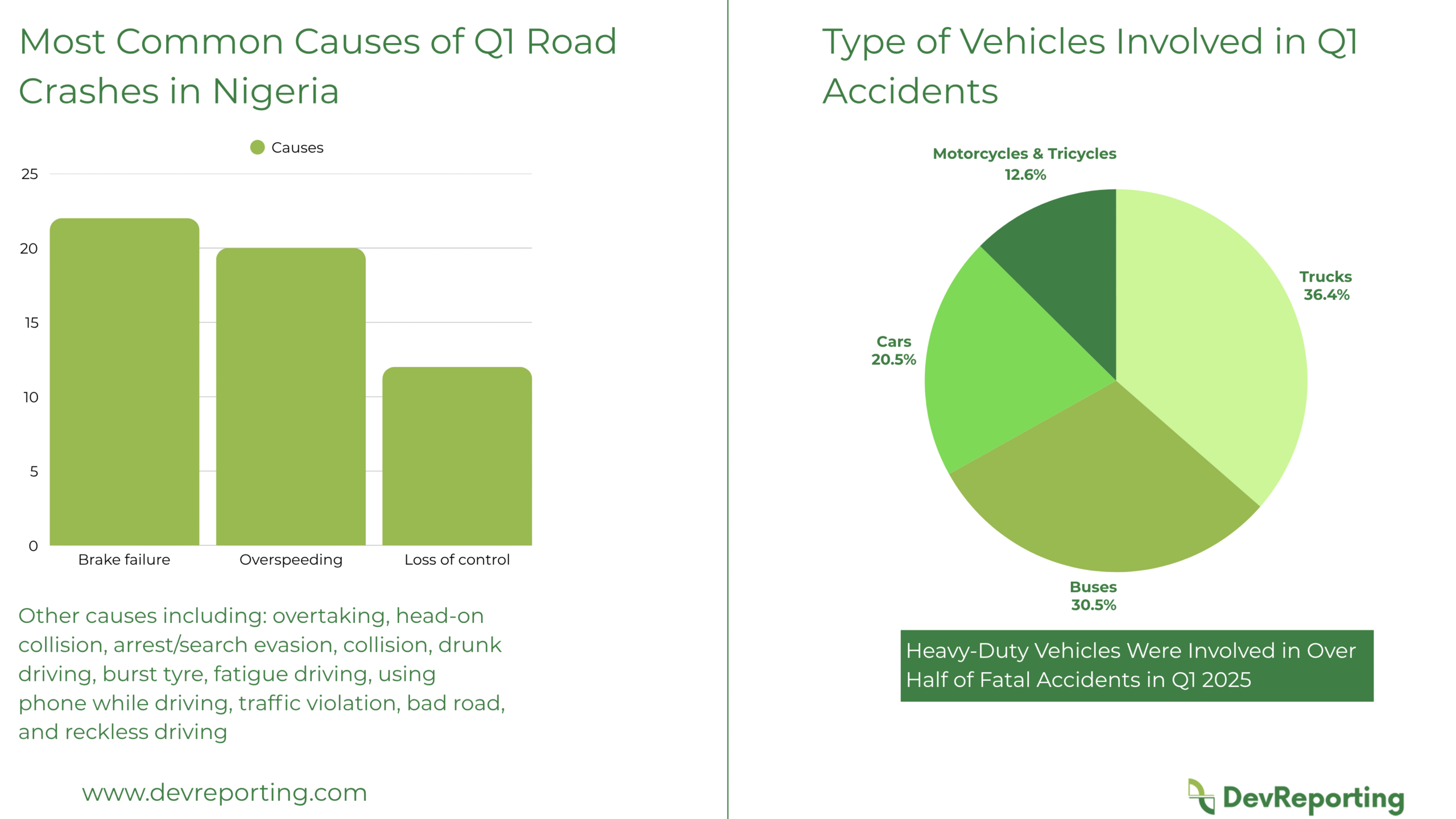
Our analysis of the Nigerian road accidents in Q1 2025 revealed that trucks and buses were predominantly involved in most fatal accidents between January and March. Out of 187 vehicles involved in these crashes, 55 were trucks and 46 were buses. Aside from 31 cars involved, motorcycles and tricycles were involved in 19 accident cases.
In January, for instance, 13 heavy-duty trucks were involved in 12 of 18 cases reported. Similarly, 14 buses were involved in 12 cases.
READ ALSO: From Disguise to Dismissal: Nigerian University expels student over fetish practices, drug peddling
In the following month, nine heavy-duty trucks were involved in six of the reported crashes, while seven buses were involved in six reported cases. For March, 33 trucks were involved in 26 reported cases, while 26 buses were involved in 21 reported cases.
This data underscores concerns about the role of heavy-duty vehicles in accidents.
FRSC data shows 1,591 fatalities
According to FRSC, in the first quarter of 2025, a total of 2,650 road traffic crashes were recorded nationwide, with a total of 1,591 fatalities and 9,298 persons injured.
In comparison with Q1 2024, FRSC said a total of 2,674 crashes were recorded, while 1,471 persons died, and 8,659 persons were injured. It further noted that while 24 more crashes were recorded in 2024, 122 more persons died, and 639 more persons were injured in 2025.
The statistics provided by the FRSC further reads in part: “There is a 1 per cent reduction in road traffic crashes in the first quarter of the year 2025 over the first quarter of the year 2025. Additionally, there is an 8 per cent increase in the total number of persons killed in road crashes in the first quarter, 2025 over the first quarter, 2024.
“There is also a 7 per cent increase in the number of persons injured in road crashes in the first quarter of 2025 when compared to 1st quarter of 2024.”
Meanwhile, the agency did not provide a breakdown of the incident.
Expert speaks
Addressing the trend of road accidents, Mr Odewumi identified a lack of proper training and behaviours such as drinking alcohol, fatigue driving, and drug addiction as some of the factors responsible for most road accidents in the country.
For the heavy-duty tankers, he said, “the drivers are not properly trained in the first instance, secondly, they are now being implicated in alcohol drug addiction, when you do a alcohol and drug test, many of them will fail the test, and many of those vehicles you see are ‘tokunbo’ vehicles.
“The cost of acquisition of heavy-duty trucks is high, so when you have a driver that is tipsy, partly on drugs and partly fatigued, drivers are expected to pack, rest and relax, in fact along major highways, we are supposed to have rest stations but in Nigeria, a driver might just take a truck and say he is going to Kano from Lagos,” Mr Odewumi added.
While the major causes of the road crashes were brake failure (22), overspeeding (20), and loss of control (12), other causes included overtaking, head-on collision, evading arrest/search, collision, drunk driving, burst tyre, fatigue driving, using phone while driving, traffic violation, bad road and reckless driving.
“From recent research, we look at the causes of trend analysis, human factors account for about 80 per cent, and under it, you have speed violation, which is the largest of all the factors. Unlawful overtaking and ignoring traffic signals, fatigue etc. When you combine these, you have the problem of human elements.
“Then, when you combine environmental factors, you have mechanical issues like the burst, because most of the vehicles are ‘tokunbo’. If I am going to classify it, human behavior accounts for 80 per cent, environmental factors about 12 per cent, and then the other factors: the infrastructural system and the absence of monitoring and evaluation,” he said.
Recorded cases during festive, holiday periods
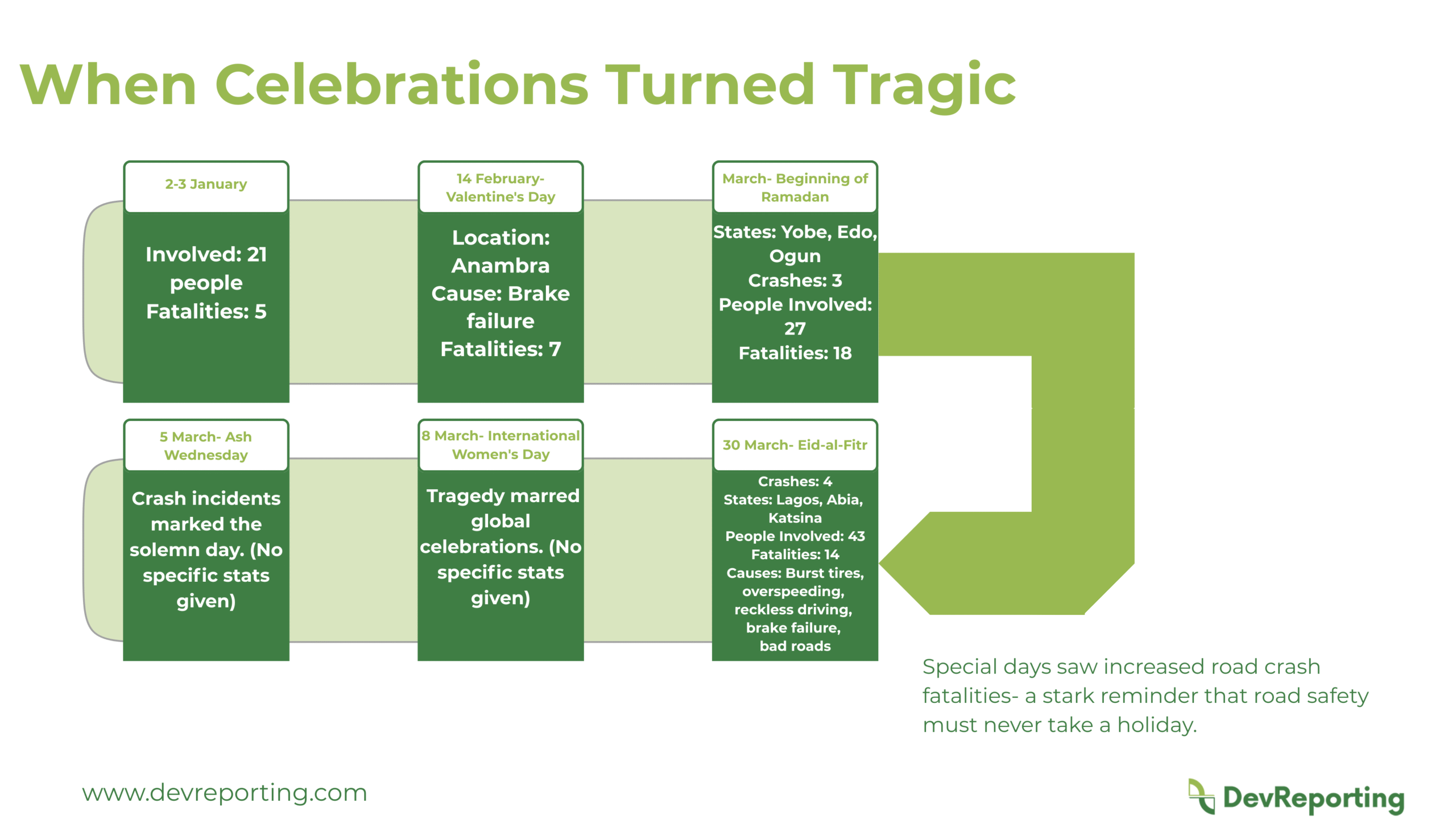
Data from the Nigerian road accidents statistics also show that tragic road crashes occurred on special days and holidays, claiming lives. On 2 and 3 January, crashes involved 21 people, resulting in five deaths. On Valentine’s Day, 14 February, a brake failure incident in Anambra killed seven people celebrating the holiday.
During Ramadan’s commencement in March, three crashes in Yobe, Edo, and Ogun states involved 27 people, claiming 18 lives. Other incidents occurred on Ash Wednesday, 5 March, International Women’s Day, 8 March, and Eid-el-fitr 30 March.
The Eid-el-fitr celebrations saw four crashes in Lagos, Abia, and Katsina, involving 43 people, with 14 fatalities. Causes included burst tires, overspeeding, reckless driving, loss of control, bad roads, and brake failure. These incidents highlight the need for improved road safety measures.
Way forward
Speaking on the way forward, the expert lamented the state of alternative transport systems like the rail and pipeline, citing the failures of the alternative systems as a major cause of the shift to road transportation of combustible commodities like fuel.
“There are alternatives, but we have allowed the alternatives to become moribund for long years. The number one alternative is the rail. It is the donkey of the transportation system. It is safer, cheaper, and more assured. You can move almost 70 people with one train. In developed countries, we have seen trains moving almost 200, but look at how many years we have neglected that side. It is the failure of the rail that made everybody translate everything to the road.
“The second point of the alternatives is the pipeline. The pipeline could carry the wet cargo efficiently, but tragically, we did all these pipelines, but people are bursting it despite the millions spent in the construction. Immediately we start transporting in these pipelines, people would already know, and then they start bursting them.”
Additionally, he suggested engagement and integration of pipeline communities into the coordination and integration system. He also recommended collaboration with community leaders to monitor and protect the pipelines while efforts are geared towards the development of such communities.
“The Inland waterways are the third option to road and the option to road accidents. When we get these three working, our accident rate will be the lowest in the world.
We are now recommending that we should do speed management since we know that speed limit is one of the major causes. If you reduce speed, you can cut your chances of having an accident by 80 per cent. Constant stakeholders engagement and interaction, suggesting non-accident bonuses for drivers as a means of encouraging safe driving”, he submitted.
As travelers rush home for the Eid-il-Kabir holidays, drivers must exercise caution, adhere to speed limits, and ensure their vehicles are roadworthy. Passengers are also advised to be vigilant and report any reckless driving behavior to the authorities.

